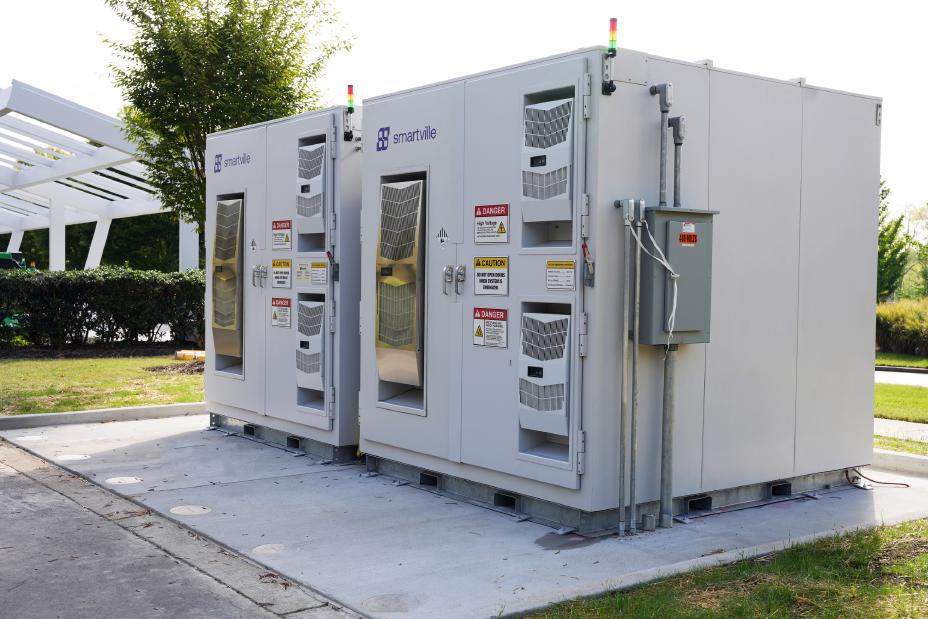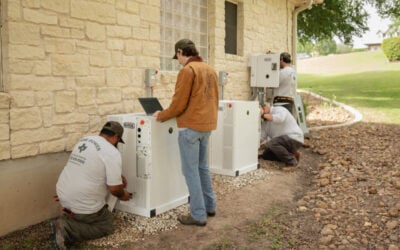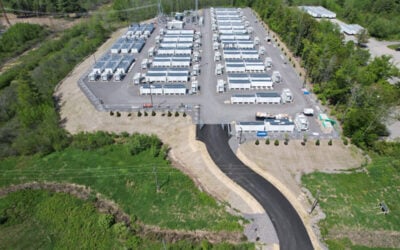
This edition of news in brief from around the world in energy storage includes Enel X, NineDot Energy and Nissan.
Enel X sells US energy storage unit
A distributor energy company in Macquarie Asset Management’s portfolio has acquired an Enel X commercial and industrial (C&I) energy storage business in the US.
Calibrant Energy, an energy-as-a-service platform, was launched in 2020 as a joint venture (JV) between Macquarie Asset Management’s Green Investment Group (GIG) and Siemens. It is now owned solely by Macquarie and managed by its Macquarie Green Energy Transition Solutions (MGETS).
It announced last week (7 October) that it has closed the acquisition of Enel X Storage, also known as Enel DES.
Try Premium for just $1
- Full premium access for the first month at only $1
- Converts to an annual rate after 30 days unless cancelled
- Cancel anytime during the trial period
Premium Benefits
- Expert industry analysis and interviews
- Digital access to PV Tech Power journal
- Exclusive event discounts
Or get the full Premium subscription right away
Or continue reading this article for free
Enel DES is a developer, owner and operator of distributed energy technologies for C&I and institutional customers, including battery energy storage system (BESS), solar PV, microgrids and electric vehicle (EV) infrastructure.
Calibrant bought the business from Enel X North America, the digital energy solutions arm of Italy’s Enel Group. The Macquarie portfolio company is involved in similar projects to its new acquisition.
It claimed in an announcement last week (7 October) that Enel DES adds more than 330MWh of operational assets to Calibrant’s portfolio, along with a pipeline that includes around 700MWh of late-stage developments and 2GWh of optimisation service contracts.
C&I continues to comprise the smallest segment of the US energy storage market, with utility-scale the biggest by far, followed by residential, according to reports from Wood Mackenzie. However, the market research and analysis firm has said it expects to see strong growth in C&I over the next ten years due to strong underlying market fundamentals such as the need for corporates to reduce energy costs and increase their shares of renewable energy.
Nissan installing Leaf battery storage systems at US HQ
Battery storage systems based on second life electric vehicle (EV) batteries will be installed at Nissan’s Americas headquarters in Tennessee.
The Japanese automaker announced earlier this month (3 October) that it will deploy two separate battery energy storage system (BESS) solutions which repurpose batteries from the Nissan Leaf EV at the HQ in the Tennessee city of Franklin.
The systems will be used for peak shaving, managing the facility’s energy consumption and reducing electricity costs by charging from the grid during off-peak times and lowering grid electricity imports during peak times. US C&I electricity customers generally pay demand charges to utilities for power drawn from the grid during monthly coincident peaks.
Nissan is partnering on the project with electric cooperative Middle Tennessee Electric, utility power distribution solutions provider Seven State Electric Corporation and the University of Tennessee-Oak Ridge Innovation Institute.
Two containerised BESS units will feature batteries from between 50 and 60 Nissan Leafs. One unit will use complete 40kWh Leaf battery packs to create 500kWh of storage capacity. The other will use Leaf battery modules for 1MWh capacity.
The batteries were collected after a service replacement. The carmaker said that while Tennessee does not face particularly high demand charges as seen elsewhere in the US, the project will test out the concept of peak shaving that could be replicated and applied in other regions.
Middle Tennessee Electric will also trial the BESS solutions’ ability to provide demand response to its network, with it and other partners to conduct the study for over a year. That includes figuring out how best to balance batteries that have come from different sources with different states of health (SOH), Chris Goddard, regional energy and environmental manager at Nissan, said.
Read more Energy-Storage.news coverage of second life battery storage.
NineDot raises ‘more than US$40 million’ through tax equity transaction
US community-scale energy storage developer NineDot Energy has closed its first tax equity financing, monetising investment tax credits (ITCs) from projects in New York.
Finance broker Monarch Private Capital facilitated the transaction, which was related to seven projects in the New York City metropolitan area and, according to NineDot, is worth more than US$40 million.
NineDot focuses on projects in urban New York and was the first company to deploy Tesla Megapack BESS units in the city. At the beginning of this year, it secured US$225 million in equity capital commitments from investors including Manulife Investment Management and Carlyle.
The developer’s business model largely focuses on New York State’s Value of Distributed Energy Resources (VDER) programme, which sees distributed resources like solar PV and energy storage compensated for the power they put into the grid, based on the value they provide across key metrics such as location and time. Customers, including corporates like coffee chain Starbucks, subscribe to NineDot projects or portfolios.
NineDot wants to put more than 400MW of community battery storage into development, construction or operation by the end of 2026. Its 3MW/12MWh Megapack system in the Bronx is its only operational project so far but the company has a few under construction and said some of those will go into operation within the next “several months”.
The tax equity financing raises capital for the developer while giving the undisclosed buyer the ability to reduce future tax liabilities with its ownership of the credits.
“We are confident that battery storage projects will attract even more backers, as these sites deliver predictable costs and cash flows while providing important societal benefits,” NineDot CEO and co-founder David Arfin said, adding that “a significant amount of capital and creativity” is needed to create low-carbon energy solutions.





